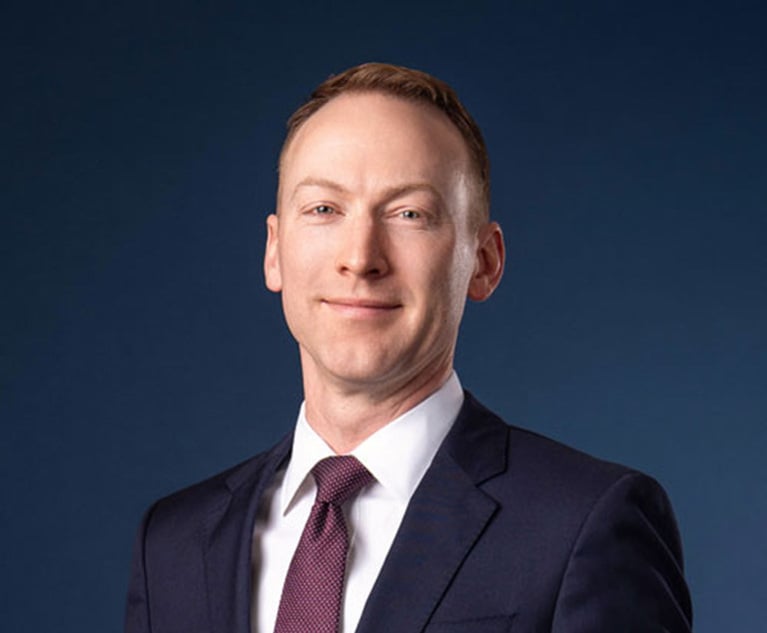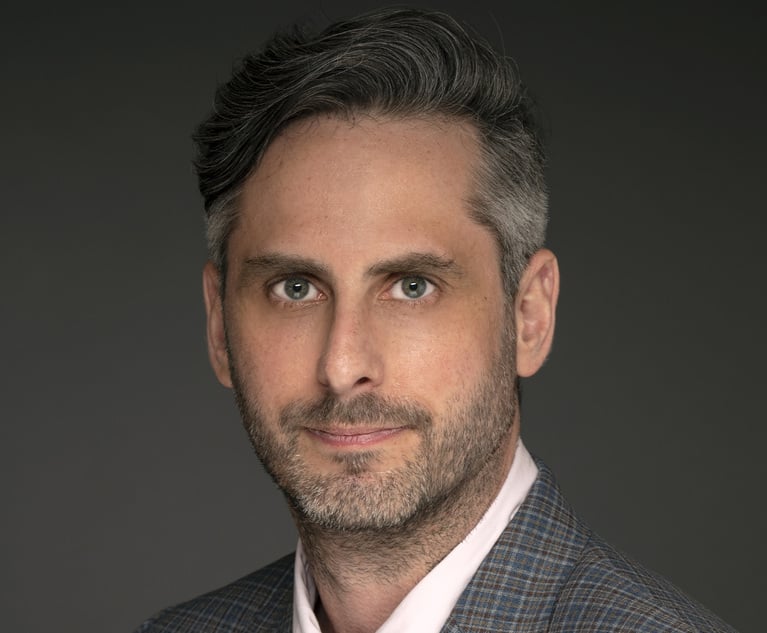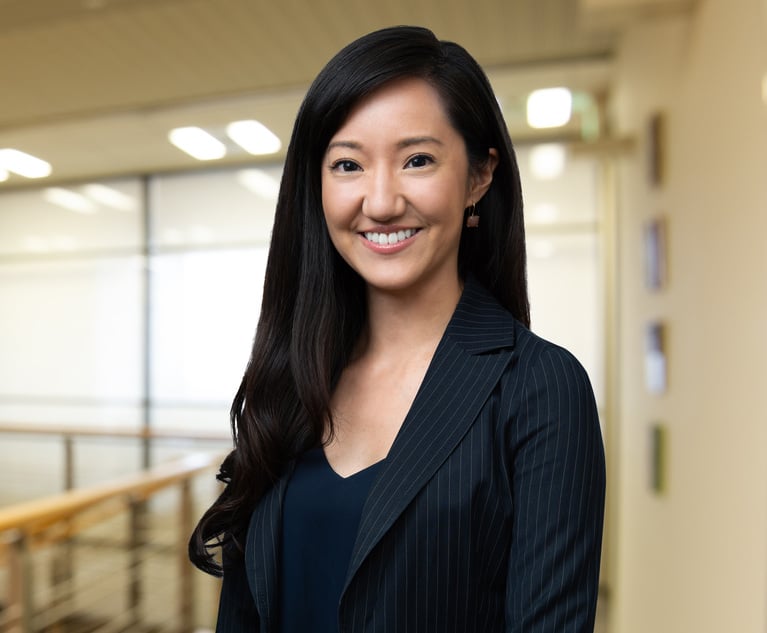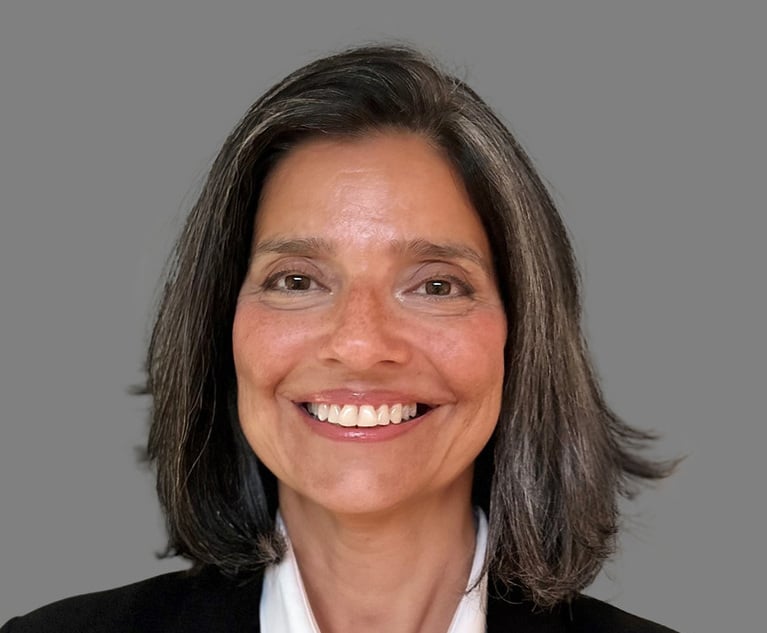Purvi Shah Is Perfecting the Art of 'Movement Lawyering'
The founder and executive director of Movement Law Lab has embarked on a journey to train and support lawyers and legal organizations dedicated to social justice.
November 29, 2018 at 09:49 AM
6 minute read
 Protesters march through Ferguson streets on Aug. 20, 2014. (Photo: Jamelle Bouie via Wikimedia Commons)
Protesters march through Ferguson streets on Aug. 20, 2014. (Photo: Jamelle Bouie via Wikimedia Commons)
Purvi Shah has a vision that law should serve society as a building block for equality and an architect for justice.
But the deep-rooted societal problems of racism and inequality surfacing in U.S. culture—including police shootings and sexual harassment—have made Shah see that lawyers must do more to realize her vision.
Shah, founder and executive director of Movement Law Lab, graduated from the University of California, Berkeley School of Law in 2006, the same year that she founded the Community
 Purvi Shah
Purvi Shah
Justice Project of Florida Legal Services, representing taxi drivers, tenant unions and immigrants rights groups with civil rights and policy issues. By 2012, she was the founding director of the nation's first movement lawyering institute, the Bertha Justice Institute at the Center for Constitutional Rights in New York City. She's won an array of fellowships for her work, such as a Harvard Law School Wasserstein Fellowship and a Soros Equality Fellowship.
Shah, 37, has embarked on a journey to train and support lawyers and legal organizations dedicated to placing the full force and power of the law behind communities fighting for social justice. The idea, known as “movement lawyering,” is getting a boost from Shah's nonprofit, which funds and incubates projects by attorneys and legal organizations looking to make a difference.
Law.com spoke with Shah, a Baltimore resident whose parents are from India, about what movement lawyering is, its origins and connection to Black Lives Matter and what her incubator is doing to light the fire of change. Here are her answers, edited for brevity and clarity:
Some people may not have heard of “movement lawyering.” What does it mean?
Movement lawyering is an approach where law is used in collaboration with community organizing and social movements. With intentional collaboration and strategizing, lawyers can use our traditional tools—whether impact litigation or direct services or policy work—paired with grassroots organizing and social movements to lead to more systemic transformation.
What are the origins of movement lawyering?
It's existed for a very long time, not just in the United States. You can look at struggles for justice—like anti-colonial struggles, the struggle to free South Africa. Lawyers have always been a part, whether defending activists who were arrested or taking community demands and turning them into the Civil Rights Act. Historically, this approach to lawyering has been around. It's mostly been a hidden practice. It's not one that's risen to the surface; it's not one taught in law school. Movement lawyers have been practicing in spite of the traditional way we are taught the law. In this movement, movement lawyering is rising and surfacing more to the top.
How has movement lawyering become more prominent since the Black Lives Matter movement?
There's been a long-standing history of black communities that have been organizing against systemic racism. The history runs deep in America—the very foundation of the country was built on the enslavement of black people. If you look at the broader arc of a movement for black lives, the movement has been around a long time. Whether the movement to end slavery, the civil rights movement, the Black Power movement, and now the movement for black lives. In 2014, after Michael Brown was killed, there was an enormous and powerful response, a community lamenting the loss of one of its children. It sparked the conscience of our country. I was in Ferguson, Missouri, right after Michael Brown was killed. In these uprising movements there are immediate responses and roles for lawyers to play. The idea is to galvanize lawyers to play a role in the movement for black lives, moving forward, and to help create a vision for Black Lives Matter. The Ferguson crisis didn't come in a vacuum. It came from historical discrimination, lack of housing, gentrification, fees and fines and debtors' prisons.
Your organization, Movement Law Lab, is working to advance movement attorneys and legal organizations. What is your incubator doing?
The idea for Movement Law Lab came out of 10 years of looking at the field saying, “It's not enough to transform the way lawyers work. We need a new network of legal institutions that in their DNA have an approach that connects law to social movements and community organizing.” Fifty years ago, we saw the birth of a new generation of legal organizations like the ACLU and Center for Constitutional Rights and National Lawyers Guild. It came out of unrest in our country. Those organizations have been the front edge of civil rights. We are in a time in which we need a new generation of those organizations that are agile and able to respond in real time to things happening in our community. Our goal with the incubator is to launch those new generations of legal organizations.
Could you give me an example?
I'll talk about the Community Justice Project in Florida and the Detroit Justice Project. Both of these organizations are legal service providers in their cities. They do a vast range of legal work: impact litigation to direct services. They work on issues from mass incarceration to housing. Take an issue like displacement, tenants' rights and eviction. The predominant legal organization would take in individual tenants going through eviction, and they may represent them. It's certainly a valuable program. But organizations like Community Justice Project would do it differently. They'd say, “Where can they help build a tenant union?” In a union, they are trying to collectivize them in solving the problem. They may do the same legal work of individual representation, but, in addition, sit with the tenant group and ask if there's legislation that may help. It's looking at the bigger-picture problems and walking shoulder to shoulder with the community to try to find solutions instead of just managing the symptoms of the problem.
Looking forward—if this were a perfect world and you met all your objectives—what would that look like?
For me, what I'd see is black and brown communities, immigrant communities, working class communities in the U.S., where our communities are safe in the world. An honest day of work can lead to a sustainable living. Health care and jobs are plentiful, and children are being educated and not being incarcerated. It's about transforming systemic and violent and harmful systems we have in our society. In that world, there would be a web and constellation of legal organizations that are humbly practicing and working alongside the grass-roots organizations.
Angela Morris is a freelance journalist. Follow her on Twitter at @AMorrisReports.
This content has been archived. It is available through our partners, LexisNexis® and Bloomberg Law.
To view this content, please continue to their sites.
Not a Lexis Subscriber?
Subscribe Now
Not a Bloomberg Law Subscriber?
Subscribe Now
NOT FOR REPRINT
© 2024 ALM Global, LLC, All Rights Reserved. Request academic re-use from www.copyright.com. All other uses, submit a request to [email protected]. For more information visit Asset & Logo Licensing.
You Might Like
View All
How I Made Practice Group Chair: 'Be a Good Partner and Colleague,' Says Logan Drew of Robins Kaplan

How the Deal Got Done: Sidley Austin and NWSL Angel City Football Club/Iger

How I Made Partner: 'Don’t Be Scared to Be Ambitious,' Says Aya Eguchi of Morrison Foerster

How I Made Practice Group Chair: 'It's Not Just About Legal Expertise,' Says Alison O'Dwyer of Fullerton Beck
Trending Stories
Who Got The Work
Michael G. Bongiorno, Andrew Scott Dulberg and Elizabeth E. Driscoll from Wilmer Cutler Pickering Hale and Dorr have stepped in to represent Symbotic Inc., an A.I.-enabled technology platform that focuses on increasing supply chain efficiency, and other defendants in a pending shareholder derivative lawsuit. The case, filed Oct. 2 in Massachusetts District Court by the Brown Law Firm on behalf of Stephen Austen, accuses certain officers and directors of misleading investors in regard to Symbotic's potential for margin growth by failing to disclose that the company was not equipped to timely deploy its systems or manage expenses through project delays. The case, assigned to U.S. District Judge Nathaniel M. Gorton, is 1:24-cv-12522, Austen v. Cohen et al.
Who Got The Work
Edmund Polubinski and Marie Killmond of Davis Polk & Wardwell have entered appearances for data platform software development company MongoDB and other defendants in a pending shareholder derivative lawsuit. The action, filed Oct. 7 in New York Southern District Court by the Brown Law Firm, accuses the company's directors and/or officers of falsely expressing confidence in the company’s restructuring of its sales incentive plan and downplaying the severity of decreases in its upfront commitments. The case is 1:24-cv-07594, Roy v. Ittycheria et al.
Who Got The Work
Amy O. Bruchs and Kurt F. Ellison of Michael Best & Friedrich have entered appearances for Epic Systems Corp. in a pending employment discrimination lawsuit. The suit was filed Sept. 7 in Wisconsin Western District Court by Levine Eisberner LLC and Siri & Glimstad on behalf of a project manager who claims that he was wrongfully terminated after applying for a religious exemption to the defendant's COVID-19 vaccine mandate. The case, assigned to U.S. Magistrate Judge Anita Marie Boor, is 3:24-cv-00630, Secker, Nathan v. Epic Systems Corporation.
Who Got The Work
David X. Sullivan, Thomas J. Finn and Gregory A. Hall from McCarter & English have entered appearances for Sunrun Installation Services in a pending civil rights lawsuit. The complaint was filed Sept. 4 in Connecticut District Court by attorney Robert M. Berke on behalf of former employee George Edward Steins, who was arrested and charged with employing an unregistered home improvement salesperson. The complaint alleges that had Sunrun informed the Connecticut Department of Consumer Protection that the plaintiff's employment had ended in 2017 and that he no longer held Sunrun's home improvement contractor license, he would not have been hit with charges, which were dismissed in May 2024. The case, assigned to U.S. District Judge Jeffrey A. Meyer, is 3:24-cv-01423, Steins v. Sunrun, Inc. et al.
Who Got The Work
Greenberg Traurig shareholder Joshua L. Raskin has entered an appearance for boohoo.com UK Ltd. in a pending patent infringement lawsuit. The suit, filed Sept. 3 in Texas Eastern District Court by Rozier Hardt McDonough on behalf of Alto Dynamics, asserts five patents related to an online shopping platform. The case, assigned to U.S. District Judge Rodney Gilstrap, is 2:24-cv-00719, Alto Dynamics, LLC v. boohoo.com UK Limited.
Featured Firms
Law Offices of Gary Martin Hays & Associates, P.C.
(470) 294-1674
Law Offices of Mark E. Salomone
(857) 444-6468
Smith & Hassler
(713) 739-1250








